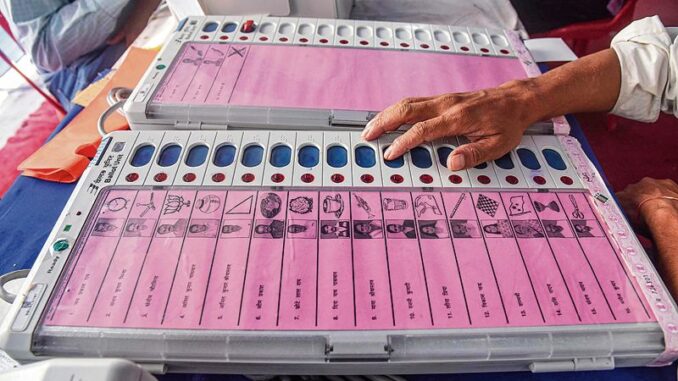
“If business interests are to be kept away from the political system, another method of financing political parties and their election campaigns has to be evolved. It could entail state sponsorship as well as allowing individuals to donate to the party of their choice. Transparency has to be the key in formulating any such system. The present scheme of electoral bonds lacks this basic element. It tried to shift from siphoning off unaccounted funds into campaign chests but failed to fulfil the other basic criteria of providing transparency to the general public. It is difficult to sustain the argument that purchases of bonds are kept confidential to ensure voters’ privacy. In the case of institutions or business organizations especially, this defense is not adequate. Shareholders, for instance, are surely entitled to know the way in which the company’s resources are being utilized. Similarly, consumers need to know as it could influence purchasing decisions.”

Financing of political parties has always been a problematic issue. For many decades, there was tacit acceptance of the fact that illicit money would be used in this process. The image of the politician receiving wads of cash in suitcases has defined the concept of electoral funding. Despite much debate over the need for electoral reforms as well as a system of campaign funding, there was little interest among the political class in changing the status quo. It thus seemed like a breath of fresh air when then Finance Minister Arun Jaitley, during a speech in Parliament in 2017, argued for reforming the structure of electoral funding. This paved the way for several legislative amendments and the introduction of the now-controversial electoral bond scheme.
It is this scheme that has now gone up for consideration by the apex court. The bonds themselves are a relatively simple concept. These are interest-free banking instruments that function like promissory notes and can be bought by an individual or institution. They can be redeemed within 15 days in the bank account of a registered political party. The aim of creating this instrument was ostensibly to shift from the anonymous cash system to one that used recognized banking channels instead. In other words, avoiding the use of illicit funds or what is termed as ‘black money’.
The fatal flaw in the scheme is the anonymity given to the donor in this process. The information about the donor’s name is confined to the public sector bank concerned and such data is available for access by the Central Government. The general public, thus, remains in the dark about the donors to various political parties. This has been justified on the grounds of enabling voters to maintain secrecy over their electoral preferences.
Such an argument is possible for individuals but certainly not for corporates donating to political parties. Industrial houses have traditionally been agnostic as far as ideologies are concerned though there is always a preference for political parties that could represent stability. This is primarily because the fate of investments and the progress of business interests depends largely on a stable and peaceful political environment. Given the all-pervasive role of the government in determining economic policies right from Independence, it has also always been in the best interests of corporates to maintain a close and harmonious relationship with the government of the day. A reflection of this is the unstinted praise of government policies by chambers of commerce even if decisions taken in the annual Budget, for instance, are privately termed as onerous or unsettling.
In a bid to hedge bets prior to an election also, there has been a tendency for business houses in the past to provide financial support to political parties across the spectrum. It is learnt that sometimes several contestants in a particular constituency have been provided funds. Companies, therefore, cannot be compared with individuals in terms of voter preferences.
The situation has now altered considerably as the government and thus the ruling party are aware of the source of purchasers of electoral bonds. Such knowledge is bound to make corporates wary of supporting Opposition parties and thus creates a skewed political landscape. The data is revealing. According to the Association for Democratic Reforms, the Bharatiya Janata Party received Rs 5,271.9 crore from electoral bonds from 2016-17 to 2021-22 compared to Rs 1,783.9 crore for all other national parties combined. In the case of direct corporate donations, the BJP received Rs 3,299 crore, followed by the Congress with Rs 406 crore.
In this backdrop, the argument can be made that corporates should not be allowed to give donations to political parties. An article in the Harvard Business Review (January 2022) delved deep into this issue. It concluded that in the US, as in India, allowing direct corporate donations to political parties implied that such funds were meant to elect candidates that would do the industry’s bidding or support specific causes. It contended it also went against shareholders’ interests as most were generally unaware of the nitty-gritty of corporate operations, including donations to political parties. This is also true of Indian companies, where shareholders have extremely limited knowledge about firms in which investments have been made.
Doing away with corporate financing, however, would mean that a more transparent process of funding needs to be established as part of electoral reform. It cannot be carried out in a vacuum. In this context, one has to recall the ban imposed on corporate donations to political parties imposed in 1969 by then Prime Minister Indira Gandhi. The only effect this 16-year ban had was to drive campaign funding underground and enhance the role of black money.
If business interests are to be kept away from the political system, another method of financing political parties and their election campaigns has to be evolved. It could entail state sponsorship as well as allowing individuals to donate to the party of their choice. Transparency has to be the key in formulating any such system. The present scheme of electoral bonds lacks this basic element. It tried to shift from siphoning off unaccounted funds into campaign chests but failed to fulfil the other basic criteria of providing transparency to the general public. It is difficult to sustain the argument that purchases of bonds are kept confidential to ensure voters’ privacy. In the case of institutions or business organizations especially, this defense is not adequate. Shareholders, for instance, are surely entitled to know the way in which the company’s resources are being utilized. Similarly, consumers need to know as it could influence purchasing decisions.
The onus of devising a transparent system of political financing lies with the political class as well as the Election Commission of India. The present government took a bold step in 2017 by bringing funds meant for election campaigns into the light of day. It needs to complete the process of reforms. If it seeks to stick to electoral bonds, then it has to bring in transparency in terms of giving out the source of donations to the public. If it truly seeks to cleanse the system, however, it should be more ambitious and keep big business out of politics.
(The author is Senior Financial Journalist)




Be the first to comment